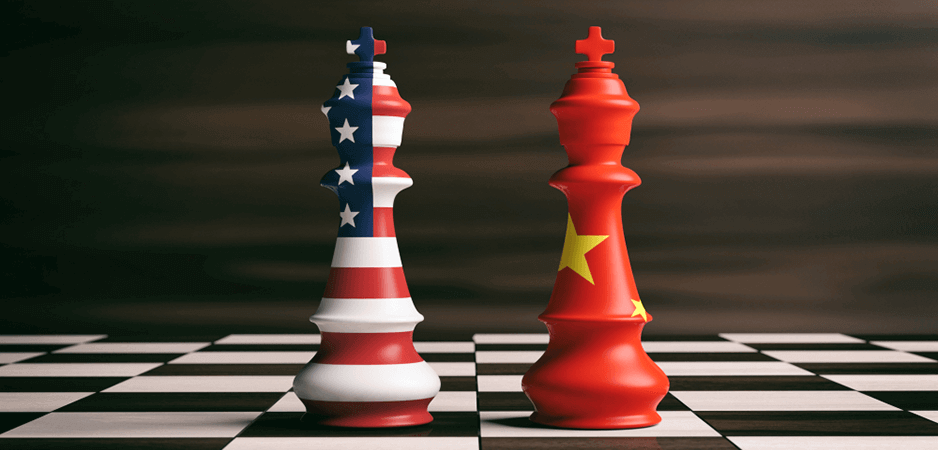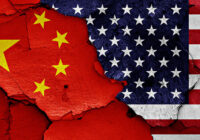China is a force to be reckoned with. Not only should the US take notice, but the rest of the developed world should do too.
A recent issue of Foreign Affairs, “Letting Go: Trump, America, and the World,” questions the extent to which the United States under President Donald Trump has abandoned its de facto post-World War II leadership of the liberal international order. The magazine further prefaces its front-page cover with the lead, “How Washington Got China Wrong,” suggesting that the US is either unable or unwilling to recognize the emerging reality presented by China’s rise to great power status.
The implication is that the ship of US grand strategy needs an immediate overhaul if it is to successfully navigate the increasingly turbulent waters of a multi-polarizing world. It is not just the US, but the societies of the so-called developed world that need to reassess their modus operandi if they are to keep up with China’s competing models of governance, business and society.
Since I spent most of March 2018 in the Chinese port city of Guangzhou, a major industrial hub and rapidly emerging metropolis, my arguments and supporting evidence are naturally informed by my recent experiences and first-hand observations. Guangzhou is the capital of Guangdong Province, which neighbors the South China Sea, Hong Kong and Macao on China’s southern coastline. Growing up in Canada, I also noticed some pointed contrasts between North American and East Asian cultures and practices. In arguing for greater Western awareness of the Chinese model of development, I outline some of these differences for the reader’s general interest.
Governance
China is governed by a principled but pragmatic Communist Party. There seems to be a peculiar social contract in place in China: The government continues to deliver robust economic growth year after year in exchange for zero dissent or public discussion of politics, religion and other topics of a taboo nature. As recently as 2013, Kurt M. Campbell and Ely Ratner pointed out in their Foreign Affairs article on “The China Reckoning” that internal Communist Party memos “warned against ‘Western constitutional democracy’ and other ‘universal values’ as stalking-horses meant to weaken, destabilize, and even break up China.” This reluctance to embrace Western-style practices and a conviction in the superiority of the Chinese system was on striking display as China was changing one of its core tenets of Communist leadership, the regular hand-over of power that has taken place since Mao Zedong’s time nearly half a century ago.
President Xi Jinping has enacted a series of reforms enshrining his position for life, essentially eliminating presidential term limits. Of course, the local media portrayed this stunning development as “democratic” since it was supposedly in the people’s best interest to avoid “venal cliques” and “factional infighting.” It is argued that these forces would threaten the existential survival of the Communist Party and, in turn, the People’s Republic of China itself. Thus, the Chinese political system was superior to the West’s version of competitive electoral politics since it eliminated partisanship and unpredictability, domestic and foreign. Perhaps the Chinese government has a point: With millions of Chinese residents migrating from the countryside to the city-centers every year, for decades now, the government faces an uphill battle keeping the economy running smoothly.
Business
China’s growth since the late 1970s has been rapid, sustained and unparalleled in the modern world. According to the World Bank, “GDP growth has averaged nearly 10 percent a year—the fastest sustained expansion by a major economy in history—and has lifted more than 800 million people out of poverty.” US-China trade in goods has increased by 30 times in 30 years (from $8 billion in 1986 to $578 billion in 2016, accounting for inflation). While there are many reasons for China’s “economic miracle,” my arguments here will rely more on my personal anecdotes than a laundry list of statistics.
The municipality of Guangzhou is much more modern and integrated than many Canadian cities I’ve visited: Vancouver, Calgary, Toronto, even Montréal. The city parks, walking plazas and urban centers are well-kept, imposing and expansive. The Mall of the World, for example, is a series of interconnected stores and restaurants that connect to the subway and run through the central strip of downtown Guangzhou. Museums, libraries and artistic installations flank its southernmost tip astride a grand view of the city’s major tourist attraction and one of the world’s tallest observation lookouts, Canton Tower. During the day, these public works reach as far as the eye can see, but at night, they shine and shimmer with a dazzling array of lights and patterns, all choreographed to impress the myriad onlookers below.
Getting around the city is surprisingly easy and affordable. The subway system is quick and efficient, intersecting the city and penetrating surrounding suburbs. Subway cars are jam-packed most hours of the day, making even the busiest rush hour in Toronto’s underground feel like a leisurely stroll through the park. Millions of bicycles are stationed strategically around the city, owned and operated by government-sanctioned private enterprises like Ofo and Mobike. Scanning a barcode with a smartphone application unlocks it remotely for a limited time, after which riders can park them anywhere else in the city. With today’s exchange rate, the cost of riding the subway or renting a bicycle is measured in cents, not dollars — an impressive discount from nearly $4 a ride for public transit in major Canadian cities.
Society
Despite the limited exposure I had, I found that Chinese culture has blended the past and present, tradition and modernity, together into one seamless web. Guangzhou, the “City of Flowers,” decorated all its roads, bike paths and pedestrian walkways with floral arrangements of all kinds. The millennia-old heritage of Confucian civilization was evident in the sculptures on display at Sun Yat-Sen University. The extensive foliage of the Sun Yat-Sen Memorial paid homage to the nationalist norms and principles embodied in the postcolonial, early 20th-century Republic of China. Going for a jog one morning in Zhujiang Park, it was refreshing to see the emphasis people placed on physical fitness. People of all ages were walking, jogging and stretching, popular with early morning joggers, tai chi practitioners, ancient sword dancers and octogenarians etching rows of Chinese character-based calligraphy in the ground.
At the risk of overgeneralizing, Chinese society seems exceedingly modest and traditional. Most personal interactions are pleasant and respectful, even with my limited grasp of the language. Still, all the shopping malls stock the latest fashions, and the trendiest brands are on display. The One-Child Policy, in effect for decades but repealed a few years ago, means that most adults are without siblings and most families still have only one child. The growing middle and upper classes may be able to afford more than one at this point. For instance, my Airbnb host — as a property owner, presumably already in the upper strata of society — was raising a pair of beautiful twin boys, an alteration to conventional family planning that would have been unthinkable just a few years ago.
As a cautionary note, state-owned media still run the day. The government tells the people what to believe about their country and the outside world. Flying into Beijing, Hainan Airlines provided me with a copy of the China Daily and the Global Times, both of which propagate the official bottom line. The Sino-centric worldview and uncritical coverage of Chinese affairs were expected. What was not expected were the progressive, almost liberal-minded stories discussed as current affairs: a #MeToo-style sex scandal in South Korea with the potential to bring down a presidential contender; the plight of LGBT youth in China’s major cities and within their own families; and the growing social media activism of feminists, represented most recently by the use of “rice” and “bunny” emojis to spell the phonetic mi-tu in order to get around government-monitoring censors.
 Of course, security cameras everywhere and a tightly controlled online ecosystem render any public protest difficult and dangerous. Virtual private networks, or VPNs, are necessary to access BBC World News, Facebook, Google and many other websites deemed unsavory by the Chinese authorities. In the end, the government has an Orwellian ability to clamp down on dissent and enforce its own version of events on society if it deems it necessary.
Of course, security cameras everywhere and a tightly controlled online ecosystem render any public protest difficult and dangerous. Virtual private networks, or VPNs, are necessary to access BBC World News, Facebook, Google and many other websites deemed unsavory by the Chinese authorities. In the end, the government has an Orwellian ability to clamp down on dissent and enforce its own version of events on society if it deems it necessary.
Watch Closely
China’s rising status, resources and capabilities in the world are a force to be reckoned with that all “developed” countries must consider. Here I have merely relayed some of the more impressive and intimidating characteristics of the Chinese development model that I deemed noteworthy. Without an awareness and recognition of China’s growth and development, it is my contention that the West will be powerless to adapt and compete in the future.
For all the downsides that authoritarianism entails, the social mobility and economic development that I witnessed in Guangzhou impressed me to no end. No doubt, China faces serious socioeconomic and environmental challenges going forward. Poverty and inequality are still rife, even in the most developed cities, and more than 1 million people are dying every year because of airborne pollution.
All the same, a rising China is of global concern and interest. As the ongoing trade tariff dispute with the US demonstrates, China’s growing economic clout means that all countries need to take note of its foreign policy ambitions. Nowhere is this more pressing an issue than on the African continent, where some have already suggested geopolitical competition is underway. It was recently revealed that China’s freely-built African Union headquarters were bugged, recording all incoming and outgoing messages since first being constructed. Furthermore, China has been buying up vast tracts of farmland in Africa, developing urban infrastructure, disbursing competitive loans, and even establishing its first military base in Djibouti as of 2017.
The future is uncertain for the West and China, but it is worth watching closely.
The views expressed in this article are the author’s own and do not necessarily reflect Fair Observer’s editorial policy.
Photo Credit: rawf8 / Shutterstock.com
Support Fair Observer
We rely on your support for our independence, diversity and quality.
For more than 10 years, Fair Observer has been free, fair and independent. No billionaire owns us, no advertisers control us. We are a reader-supported nonprofit. Unlike many other publications, we keep our content free for readers regardless of where they live or whether they can afford to pay. We have no paywalls and no ads.
In the post-truth era of fake news, echo chambers and filter bubbles, we publish a plurality of perspectives from around the world. Anyone can publish with us, but everyone goes through a rigorous editorial process. So, you get fact-checked, well-reasoned content instead of noise.
We publish 2,500+ voices from 90+ countries. We also conduct education and training programs
on subjects ranging from digital media and journalism to writing and critical thinking. This
doesn’t come cheap. Servers, editors, trainers and web developers cost
money.
Please consider supporting us on a regular basis as a recurring donor or a
sustaining member.
Will you support FO’s journalism?
We rely on your support for our independence, diversity and quality.






